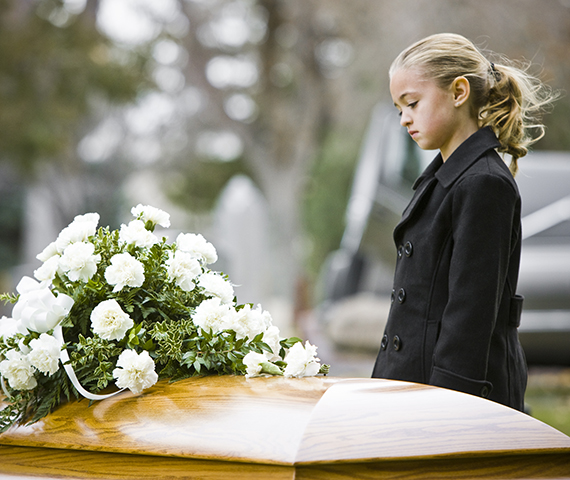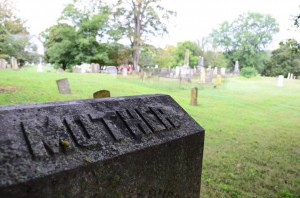 By Alan D. Wolfelt, PhD
By Alan D. Wolfelt, PhD
I received a call this past week from a long-term friend and funeral director. His father had just died the week prior to our conversation. He said, “I have always tried to help families I have served understand the value of visitation and spending time with the body. I now have a more profound awareness of how important it can be to make use of these elements of ceremony.”
I’m sure you have noticed a trend toward less use of both visitation and spending time with the body that once animated life. Yes, we continue to witness a trend toward shorter and shorter time frames of visitation and, all too often, no visitation at all.
In an effort to help you educate the families you serve about the importance of these elements, let’s review the potential value of both visitation and spending time with the dead body. As gatekeepers of the funeral ceremony, you have what I believe is a sacred obligation to help reverse this trend that is “at risk” for stripping the funeral of these essential elements.
The function of the visitation
As you probably know, the visitation was historically called the “wake” or “viewing.” The term “wake” comes from the Middle English waken, meaning “to be awake, to keep watch.” In days gone by, depending on cultural and religious customs, it was customary for the family and primary mourners to keep around-the-clock vigil over the body of the person that died. The body was kept in the home, often on display in an open casket in the parlor. When houses were built, designers integrated in French doors to allow bodies to be moved in and out of the parlor. Mourners took turns sitting at their loved one’s side 24 hours a day to safeguard the body, offer prayers, pay their respects, receive friends, and support one another. There was an awareness that staying with the body to the place of final farewell helped family and friends acknowledge the reality that the person had died.
The visitation is a time of greeting and reception that takes place prior to the service. When families host this element, they are essentially inviting people to come support them. Another term for the visitation – “calling hours” – may help you explain this element’s purpose to the families you serve. The family is opening the door, quite literally, to a time of informal social greeting and empathy. They are creating an entryway for acute and longer-term support.
Isn’t it fascinating to know from experience that one of the first things many families do after the visitation is review the guestbook to see who attended? This simple, yet instinctive behavior, speaks volumes about the importance of the visitation.
Spending time with the guest of honor
I’m sure you also realize we have witnessed a general trend toward body-absent ceremonies. This coexists with many families desiring a party-like atmosphere. Obviously, this is in contrast to authentic funerals that embrace the normalcy of an essential component of allowing themselves to be sad – to mourn. While historically we understood the essential, universal need to honor and affirm the life of the person that died with the body present throughout the entire funeral process, now the guest of honor is often nowhere to be found.
How many of you frequently hear families say, “We will just remember her the way she was when she was alive.” They often don’t know that lasting memories of the person who died are usually not of them dead. However, it is in seeing them dead that helps embrace memories of when they were alive. While the sight and presence of the dead body meets the cognitive need to verify the death, that very image usually fades, and it is the living memories that are everlasting.
Yes, we seem to be forgetting what many have known since the beginning of time. Throughout human history, clans and tribes revered and stayed present to the body until it was laid to final rest. As a matter of fact, cultures the world over have always had a passion to recover the “fellow warrior” and dignify the death by bringing home the body. While not all cultures and religions find it appropriate to spend time with the body, and we must always remain respectful of beliefs that preclude this practice, for many people the body has forever been a sacred and central element of meaningful funerals.
In referring to the dead body, I sometimes hear people say, “It is just a shell.” At times this in anchored in a religious projection, yet it is also frequently an attempt to render spending time with the body irrelevant and unnecessary. As someone who has supported people experiencing grief for over 40 years, I could not disagree more. Regardless of one’s faith (or lack thereof) in the soul and the afterlife, the body of the person who died is still precious. The body that animated life deserves to be companioned to the end of their days on earth.
Of course, there is also a segment of people who think that funeral directors are trying to make a dead person “look alive.” Yet, you well know that is not what you are doing. In fact, you are creating an opportunity for people to acknowledge that the body is dead. Regardless of one’s spiritual beliefs, it is clear to anyone who spends time with the dead body that the soul no longer resides there.
And even when we are grieving – even those of us whose callings surround us with death and grief everyday – the mind still instinctively seeks proof. So, if we are fortunate and feel the need, we see the body, we touch the body, we spend time with the body – and our minds, which may want to try to deny the truth, cannot help but begin the process of acknowledging the reality of the death.
 Bereavement originates from the word “reave” meaning “to be deprived of” or “to be forcibly robbed “of something very precious to us. But for a short time – a few hours or days after the death – we have the opportunity to still be with the person who died. This experience helps us begin to move from “head understanding” to “heart understanding” of the death. Yes, it can feel painful in the moment, yet it is still for so many people, ultimately helpful and healing.
Bereavement originates from the word “reave” meaning “to be deprived of” or “to be forcibly robbed “of something very precious to us. But for a short time – a few hours or days after the death – we have the opportunity to still be with the person who died. This experience helps us begin to move from “head understanding” to “heart understanding” of the death. Yes, it can feel painful in the moment, yet it is still for so many people, ultimately helpful and healing.
My long-time friend and funeral director reached out to me to affirm an entirely new level of understanding about why we invite families to hold visitations and spend time with dead bodies. My hope is that the next time a family tells you they have no interest in visitation or viewing that you will reflect on this article and gently and compassionately provide information, education, and honor choices around these two elements of meaningful funerals.
Remember: A meaningful funeral is not about denying death but befriending it. Please don’t contribute to the growing trend of compromised elements of funerals and direct disposition. Let’s treat bodies that animated life with the reverence and respect that they deserve. Perhaps most of all, let’s remember the value of the need to say hello on the pathway to goodbye.
CLICK HERE TO JOIN AFTERTALK
Free, Non-Profit and Non-denominational
We invite you to submit your thoughts, essays, poems or songs. Please send to info@aftertalk.com. To see past AfterTalk Weeklies, CLICK HERE

I am always humbled and hopeful when reading
Dr. Wolfelt’s writing. I feel love and humanity on this topic in which so many shrink away from. Thank you for showing us this responsibility to and for your work over so much of your life.
This is so important and my experience, as well. In fact, if I do not attend any portion of the funeral services for someone, I find myself removed from their death and can even forget they died! How horrible! Thank you for reminding us of this important and needed time.